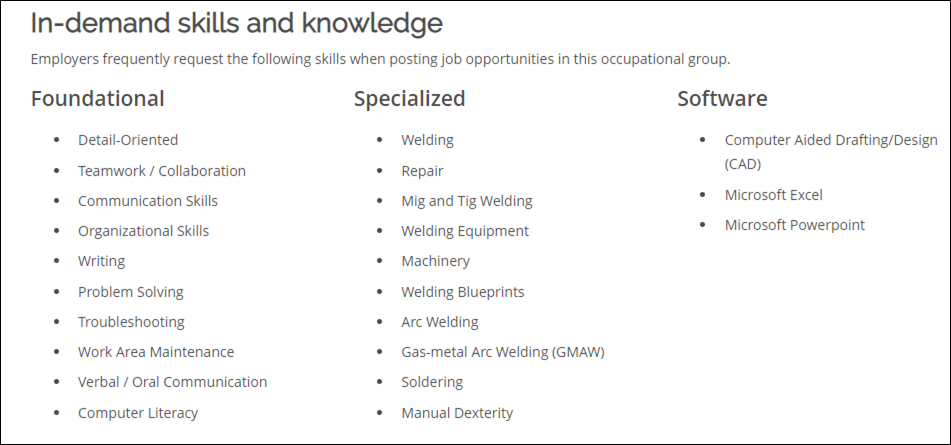There isn’t a job that hasn’t been touched in some way by digital technology, and this includes the skilled trades. The type and level of computer skills needed will vary depending on the trade, however, it is safe to say at the very least, basic computer skills are necessary.
The Ontario Government offers a way to search job profiles. Enter a job you are interested in and open the profile. These profiles are full of great information.
If you select the heading “In Demand Skills and Knowledge” you will find a list of skills needed for success in the job. It is common to find Computer Literacy listed in the ‘Foundational’ column for most jobs. You will also find a basic list of the software commonly used on the job. Below is an example of the skills section of the profile for Welders and Related Machine Operators.

Training Programs
Adult training programs prepare people for success at work and in any ongoing education or training programs they take. This training includes computer training for people who are already registered as an apprentice or those thinking about starting an apprenticeship.
Computers and Software
Adult training programs can help you develop the computer skills you need for success in a college program. If you search for college level programs online, you will find computer and software skills are often listed. For example:
- the Heavy Equipment Operator at Fleming lists Computer Skills as being important for students in this program. They also list the technology required: “Students are required to have their own computer, Internet access, webcam and microphone.” It is safe to assume that this hardware is needed to attend online classes.
- the Welding program at Loyalist has Computer Applications as a first semester course. The computer applications course includes “Outlook (email), PowerPoint, Word and Excel.”
Online Learning
Online learning is becoming increasingly common in the trades. For example, at least part of most college courses are offered online. Adult training programs can help you prepare for success in taking computer-based training. This may include:
- using PDFs, videos and online documents
- keyboarding, creating online accounts, logging in and moving around a course, uploading assignments, posting comments, asking questions and completing online tests and quizzes.
- using video conferencing software to attend class.
Communication
At work and in class you will likely be required to use technology to communicate with others. Our programs can help you develop these online communication skills. This includes:
- using smartphones, tablets and computers to send emails and texts to instructors, other students, co-workers, supervisors, customers and suppliers.
Research
At work and in class you will need to be able to use the Internet and Search Engines to research information and resources. In our programs you will have the opportunity to develop your online research skills. This includes:
- finding things such as how-to documentation, videos, manuals and information about products and services using websites, blogs, discussion forums and social media.
Apps
Our programs can also provide you with support as you develop your skills downloading and using applications (apps). Apps are common in the trades. Some apps are designed specifically for a trade or a company. Other apps are general and can be used by people in any trade. This may include using apps for:
- mapping, for calculating, converting and measuring, for estimating, for logging/tracking hours, for ordering, managing projects, managing documents and taking notes, as well as for tool tracking and planning.
Speaking of apps: Visit our blog post about the Skills Ontario App that will help you learn about careers in the trades.
Virtual Reality
It is helpful to have experience using Virtual Reality since many trades are now using Virtual Reality Simulations, as well as Augmented Reality to provide training. Many employment service organizations have a Virtual Reality option available to anyone interested in a career in the trades. Virtual Reality is a great way to experience a trade before making a career decision. To see some Virtual Reality Simulation options for the trades, visit CareerLabsVR. To learn more about how you can book a Virtual Reality experience, contact an employment services office in your area.
Computers in the Trades – Some Examples
In addition to software, online communication, research, apps and online learning, there are other computer skills needed in the trades. We have provided a few examples below.
The list below represent some of the in-demand careers in the trades in the LOCS area. We have used labour market information from the Centre for Workforce Development and the Workforce Development Board. For a detailed list of in demand trades, visit our Labour Market Information post.
Beside each occupation there is a number. You can click on this number to learn more about the career at the National Occupational Classification site.
- “The National Occupational Classification (NOC) is Canada’s national system for describing occupations. You can search the NOC to find where an occupation is classified or to learn about its main duties, educational requirements”.
- The NOC is currently moving from a four to a five-digit code. You may find the four-digit code still used in some places.
Bakers (63202)
Calculators, Point-Of-Sale systems, spreadsheets (for planning and ordering). There is also software to help with ingredient calculations and for managing costs.
Carpenters (72310)
Calculators, word processing, spreadsheets, billing and accounting software, estimating software and computer-controlled layout equipment (measuring tools).
Cooks (63200)
Calculators, spreadsheets, word processing, database, digitally controlled kitchen equipment, Enterprise Digital Assistant and restaurant management software.
Heavy Equipment Operators (73400)
Calculators, GPS, electronic scales, word processing, spreadsheets, database and laser grade control systems, displays and systems-monitoring controls.
Industrial Electricians (72201)
Spreadsheets, database, graphics software, project management software, handheld electrical equipment for electrical readings. They also install and service ethernet and process control systems.
Plumbers (72300)
Calculators, word processing, database, spreadsheets, accounting software, CAD – Computer Aided Design, online plumbing software and project management software.
Transport Truck Drivers (73300)
Calculators, GPS, database, fleet tracking/management software and handheld electronic logbooks.
Heavy-Duty Equipment Mechanic (72401)
Calculators, database, diagnostic equipment and handheld devices.
Construction Trades Helpers and Labourers (75110)
Calculators, database, digital multimeters and topographical information.
Electronic Service Technicians (22311)
Calculators, word processing, spreadsheets, database, load and configure software, programs for simulation purposes, diagnostic tools – oscilloscopes, application specific measurement and diagnostic software and apps to run diagnostic tests.
Hairstylists and Barbers (63210)
Calculators, Point-of-Sale systems, digital cameras, database, salon management software, accounting software and industry apps.
If you would like more information about how you can develop the computer skills you will need for success in an apprenticeship, contact an adult training centre in your area or reach out to Carrie Wakeford or at (705) 313-4383.




